A good time to call an HVAC pro is when your system stops working, makes strange noises, leaks fluids, or just can’t keep your home comfortable. Ignoring odd signs from your heating or cooling unit can lead to bigger headaches and pricier repairs. Honestly, it’s just easier and cheaper to act fast instead of letting the system fail completely.
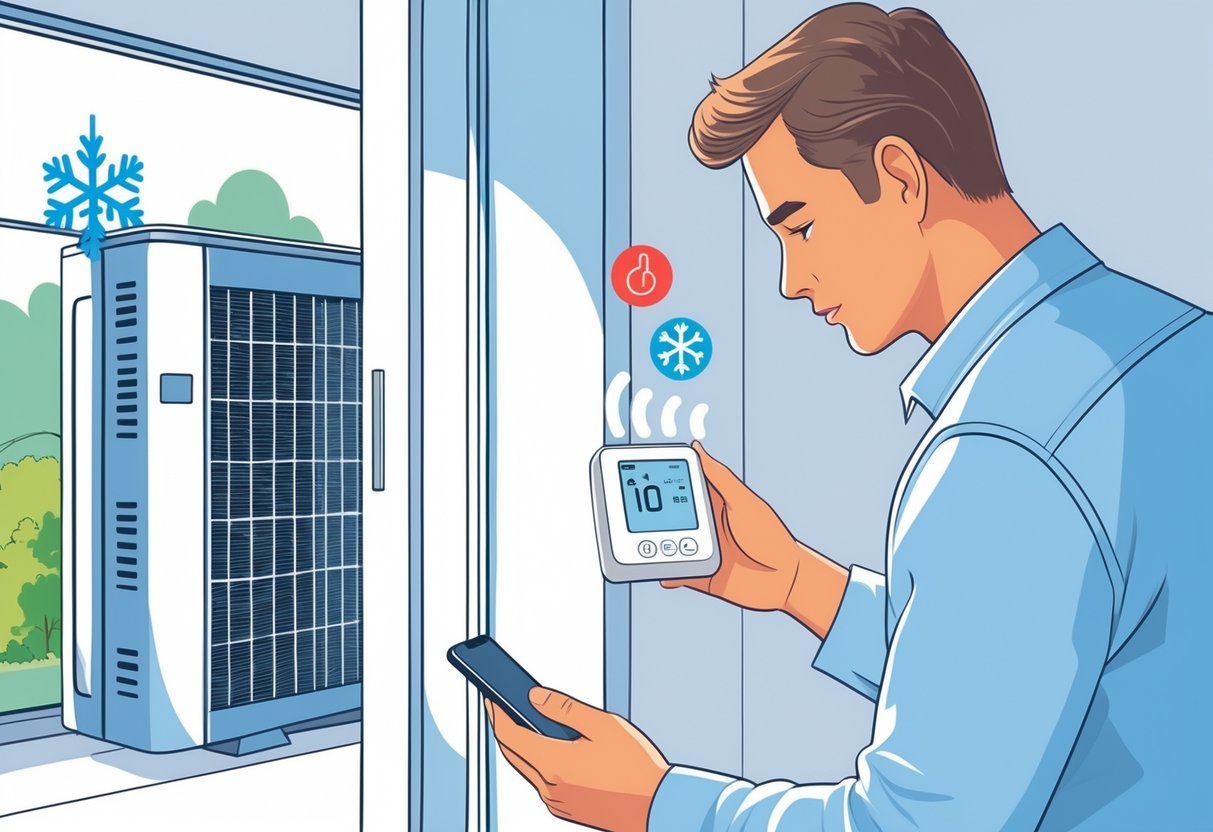
Sometimes, the warning signs are obvious—no heat in the dead of winter, or an AC blowing warm air during a heatwave. Other times, it’s more subtle: high utility bills, weird smells, or a system that keeps turning on and off. These are all signs it’s time for professional help.
Regular checkups matter, too. Pros can even recommend energy-saving upgrades to help your system run better and last longer.
Key Takeaways
- Spotting issues early helps prevent major repairs.
- Unusual sounds, smells, or temperature changes mean it’s time to call a pro.
- Routine maintenance can improve efficiency and extend system life.
Why Timing Matters When Contacting an HVAC Professional
If you wait too long to get help with heating or cooling, you could end up with bigger repair bills—and a pretty uncomfortable house. Knowing when to call can protect your equipment, improve air quality, and help your system last longer.
Need a Home Fix – Emergency or Routine?
From leaks and no-heat nights to simple tune-ups, our 24/7 hotline connects you with trusted local pros in minutes.
Understanding the Function of HVAC Systems
Heating and cooling systems do more than just keep you comfy—they help control humidity and filter the air, too. When one part fails, you might notice uneven temps or strange noises.
If airflow is weak or rooms feel weirdly warm or cold, your HVAC system probably needs a pro’s attention. Letting these warning signs slide can make the system run longer, crank up your energy bills, and risk a total breakdown.
HVAC professionals are trained to spot problems early. They use special tools to test your equipment and catch issues you might not see. A quick call can keep small hiccups from turning into wallet-draining disasters.
Seasonal Demands and Peak Service Times
Demand for HVAC repair and installation spikes during extreme weather. In summer and winter, everyone seems to call at once. If you wait until peak season, you’ll probably have to wait longer for service.
It’s smart to plan ahead—book service before the first heatwave or cold snap. Regular checks in spring and fall can help you avoid those last-minute breakdowns. Plus, you’ll have more choices for appointment times.
HVAC pros are busiest during heatwaves and cold spells. If you act early, you dodge delays and make sure your system’s ready when you really need it. For more tips, check out these signs for calling an HVAC pro.
Benefits of Proactive Maintenance
Regular maintenance keeps your HVAC system clean, checks for leaks, and makes sure everything’s running as efficiently as possible. This can cut energy costs and keep your air fresher.
A pro can catch stuff like worn parts or clogged filters before they become a real pain. Preventive care means fewer surprise breakdowns and less chance you’ll be stuck without heating or cooling when you need it most.
Honestly, taking care of things before they go wrong just helps your system last longer. Well-maintained equipment breaks down less and usually sticks around for years. For more on catching problems early, check this HVAC guide.
Warning Signs That Indicate You Should Call an HVAC Pro
Heating and AC problems usually give you some warning before totally breaking down. If you know what to watch for, you can avoid big repairs and keep your home feeling just right.
Unusual Noises or Odors
If your AC, heat pump, or furnace starts making weird sounds, something’s probably up. Grinding, banging, rattling, or screeching can mean loose or broken parts, a motor problem, or a busted belt.
Ignoring these sounds? Not a good idea. Things can get worse fast and sometimes lead to a total system failure.
Strange smells are another red flag. Musty odors might mean mold in your ducts. Burning smells? That could be an electrical issue—definitely not something to ignore.
Some odd smells can even be dangerous, so don’t wait. If you notice anything off, call a professional. You’ll keep your system safe and avoid sudden breakdowns. More warning signs are listed by Manhattan HVAC Repair and My Home Pros.
Inadequate Heating or Cooling
If your AC or furnace isn’t holding the temp you set, something’s probably wrong. Maybe some rooms are roasting while others are freezing, or the system is running but just not doing its job.
This could be a compressor issue, low refrigerant, a busted fan, or just clogged filters. Reduced airflow in heat pumps and ACs drops their efficiency, too.
Blocked vents or dirty coils can cause trouble, but sometimes it’s a deeper problem. If cleaning filters and vents doesn’t fix it, call a pro. Waiting only makes things worse and can wear out your system faster. Elite Air OKC has more on why early warning signs matter.
Unexpected Increases in Energy Bills
Did your energy bill suddenly jump? That’s a clue your heating or AC system isn’t running right. When systems lose efficiency, they work harder and use more power just to keep things comfortable.
Dirty filters, leaky ducts, low refrigerant, or failing parts can all drive up costs. Even little problems add up over time.
If your bills are up but your energy use hasn’t changed, it’s probably time for a checkup. Small repairs and regular maintenance keep your energy efficiency high.
Frequent System Cycling
Heating and AC systems should turn on and off at a steady, normal pace. If yours is cycling on and off a lot, it’s having trouble keeping the set temperature.
This quick cycling (short cycling) might be a bad thermostat, blocked airflow, overheating, or a worn part. It wears out your system faster and wastes energy, plus your home never feels quite right.
If your system’s turning on and off more than usual, call a pro. They’ll figure out what’s really going on and get things back to normal. Frequent cycling is a top warning sign according to Sig Cox HVAC.
Common HVAC Issues Requiring Professional Attention
Major HVAC problems like refrigerant leaks, bad wiring, and ice on coils can really mess with your comfort and your wallet. Getting a licensed tech in quickly is usually the best way to avoid big repair bills and keep things under control.
Refrigerant Leaks
When refrigerant leaks, your cooling drops off fast—sometimes you’ll feel warm air coming from the vents. Leaks can also spike your energy bills because the system has to work overtime, which isn’t great for its lifespan.
Look for hissing sounds, ice on the evaporator coil, or weak airflow. Breathing refrigerant is dangerous, and fixing leaks takes special training.
A certified tech will check levels, find the leak, and repair it safely. Just recharging the refrigerant without fixing the leak? That’s a temporary fix at best. Usually, a full repair is the only way to go. Learn more about why these need professional help for HVAC refrigerant leaks.
Electrical Issues
HVAC systems have a lot of electrical parts—breakers, relays, wiring, you name it. If something’s off, the unit might not start, could shut off on its own, or make weird noises.
Bad wiring is a fire risk and can wreck the whole system. Flickering lights or a tripped breaker are also signs of electrical trouble.
DIY repairs here aren’t worth the risk. Only a licensed HVAC pro should handle electrical issues. They’ll replace damaged wires, check circuit boards, and spot worn connections before things get worse. There’s more info on calling a professional for electrical HVAC problems online.
Frozen Coils
Frozen coils can stop your AC from cooling at all. You might first notice warm air from the vents, ice on the unit, or water pooling around the air handler.
Main causes? Dirty air filters, blocked ducts, low refrigerant, or a fan problem. Changing the air filter is easy, but if freezing keeps happening, you need a pro.
They’ll check for airflow problems, test refrigerant, and inspect the blower. Fixing the root cause helps you avoid water damage, mold, or a busted compressor. Catching frozen coils early can save you cash and keep things running smoothly.
When to Schedule Routine HVAC Maintenance
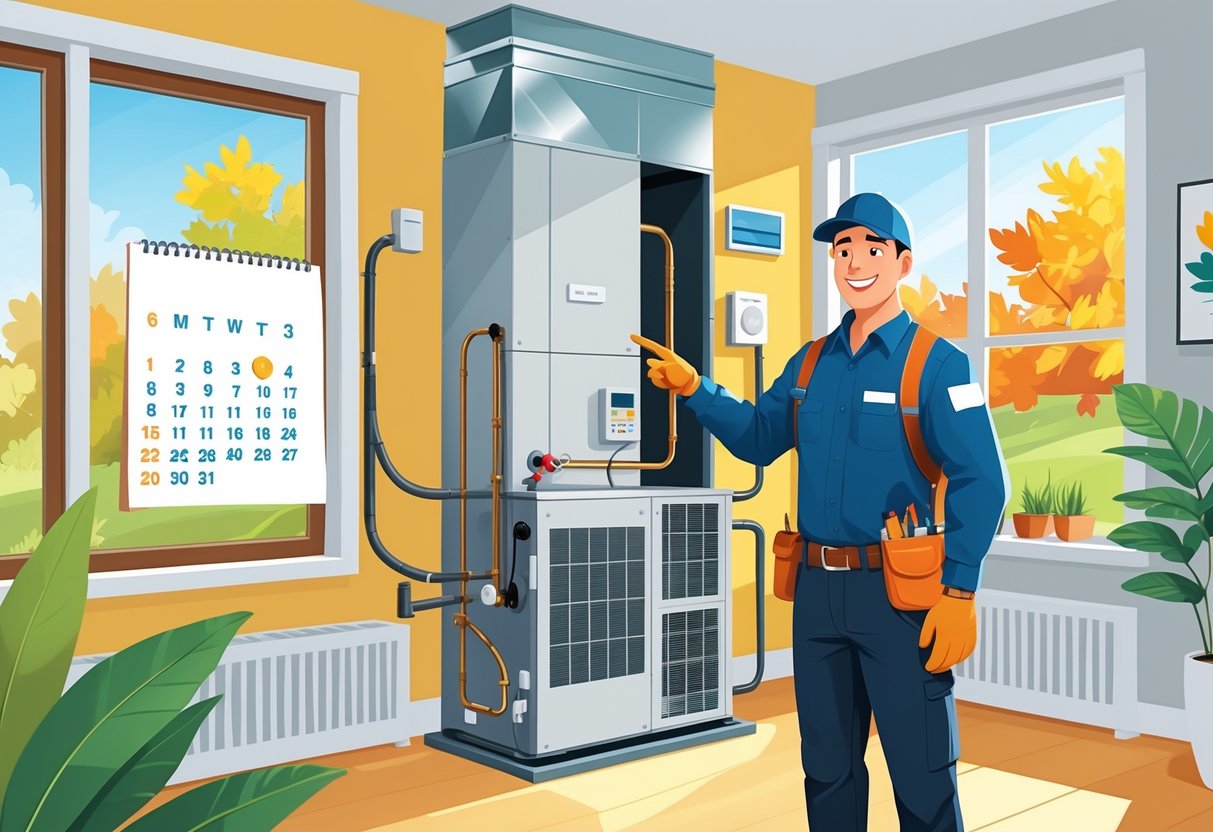
Routine HVAC maintenance keeps both your AC and heating system running efficiently. Scheduling service before big weather swings can save you money, energy, and a lot of hassle.
Optimal Times for AC Maintenance
The best time to schedule AC maintenance is in early spring, before temperatures really start climbing.
This gives a pro a chance to check refrigerant, clean coils, and test controls before summer hits hard. Early service means your AC will be ready when you actually need it.
Spring is also when contractors tend to have more open schedules, so it’s less of a headache to book a visit.
A yearly checkup is usually enough to catch worn parts, thermostat issues, or blocked drains that could cause leaks. If your system is running all the time or is over ten years old, you might want to get it looked at more often.
Curious about the ideal timing? Here’s more on recommended service schedules for air conditioning.
Best Periods for Heating System Servicing
For furnace and heating repair, early fall is generally the sweet spot.
Getting your system checked before it gets cold means a technician can inspect, clean, and swap out old filters or spot leaks.
This helps your heating stay reliable through winter. Older or heavily-used furnaces sometimes need more than one check a year just to keep things running smoothly.
Setting up service in the fall can help you avoid those frustrating winter emergencies and long waits for repairs.
Many folks go with biannual HVAC tune-ups—one in spring for cooling, one in fall for heating—especially if their system gets a workout all year. For more details, here’s a link about the best time for heating system maintenance.
Air Filter and Ductwork Considerations
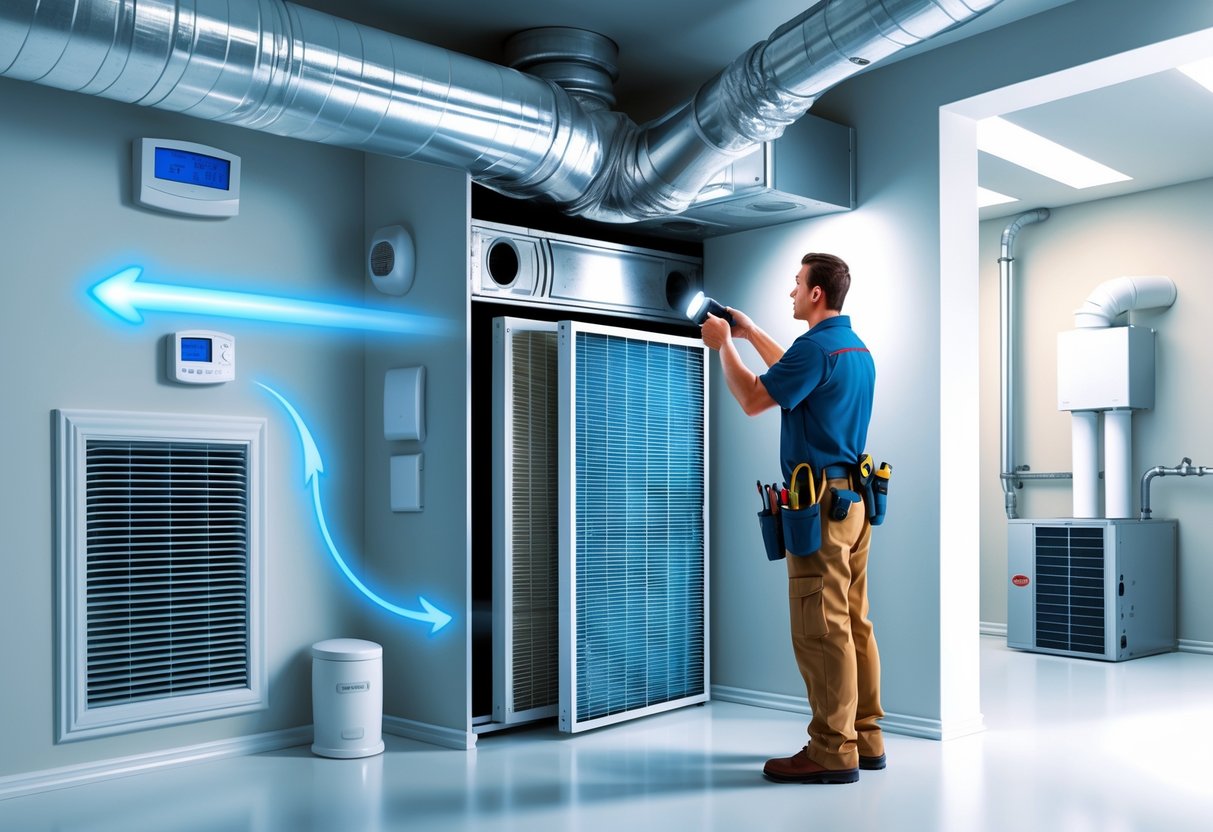
Air filters and ductwork have a bigger impact on your HVAC system than people realize.
Ignore them, and you’ll probably see higher bills, worse air, or maybe even a breakdown. Not fun.
Dirty Air Filters Impacting System Performance
A clogged air filter chokes off airflow, so the system has to work harder.
This drives up your energy use and puts extra wear on fans and other parts. Most manufacturers say to change filters every 1-3 months, but honestly, it depends on your filter and how much you use the system.
If you notice weak airflow, more dust around, or the unit just running all the time, your filter’s probably overdue for a change.
Letting a filter go too long can even make the system shut down. Checking filters regularly is a quick way to help your air stay clean and your equipment last longer.
Using a good-quality filter helps keep not just the filter, but also the fan and vents, cleaner for longer. For more on this, check out these tips for cleaner HVAC ducts.
Importance of Clean Ductwork
Ductwork carries hot or cold air all over your house.
Over time, dust, debris, and sometimes mold can build up inside. That’s bad news for both comfort and efficiency.
If you’re getting uneven heating or cooling, smelling something musty, or seeing dust puff out of vents, your ducts might need attention.
Loose or leaky ducts can also spike your bills or leave you with hot and cold spots in different rooms.
Sometimes, a pro cleaning or even replacing sections of ductwork is the only way to get things back to normal—especially if airflow drops suddenly or the air quality tanks. If you’re not sure, here’s when to call a professional for your HVAC ducts.
Upgrading or Replacing Your HVAC System
Old HVAC systems just aren’t as reliable. They break down more, cost more to run, and can make the air feel stale.
Deciding when to upgrade or replace isn’t easy, but it can save you a headache—and some cash—in the long run.
Signs It’s Time for AC Replacement
Most air conditioners last about 10–15 years. If yours is pushing that age, you might notice it’s less efficient, louder, or shutting off more often.
Uneven cooling or suddenly high bills? Those are red flags, too.
If repairs are starting to cost half as much as a new unit, it’s probably time to move on.
Units using R-22 refrigerant, which is phased out, are especially worth replacing. Newer systems are quieter and way more efficient. Here’s more on when to replace your HVAC system if you’re curious.
Quick checklist for AC replacement:
- Over 10 years old
- Rising energy bills
- Frequent repairs
- Uneven cooling
- Outdated refrigerant
Deciding on Furnace Replacement
Furnaces can last 15–20 years if you take care of them, but age isn’t the only factor.
If repairs are getting more frequent or you hear weird noises, it’s time to start thinking about a replacement.
Rising heating costs and a home that never feels quite warm enough are other hints.
Newer furnaces can save energy and improve air quality, which is a nice bonus.
Replacing both furnace and AC together? That can run anywhere from $5,000 to $12,500. Planning ahead makes that bill sting a little less. Here’s a good article on cost and timing for HVAC replacement if you want more info.
Smart Thermostats and Technology Integration
Smart thermostats and HVAC monitoring apps are pretty handy for saving energy and managing your comfort.
They work best when installed and set up by someone who knows what they’re doing.
When to Consult About Smart Thermostat Installation
It’s a good idea to talk to an HVAC pro before buying or installing a smart thermostat, especially in older homes.
Not every system plays nice with every thermostat. A technician can check your setup and recommend a model that’ll actually work.
They’ll handle installation, connect it to WiFi, and deal with any firmware updates.
Some pros even calibrate the sensors for better temperature control. Many HVAC contractors also help with compatibility and ongoing support.
Honestly, getting expert help just makes everything smoother—and you might even get a quick lesson on using the new features.
Using Apps for HVAC Monitoring and Control
Most smart thermostats come with apps that let you tweak your system from anywhere.
You can adjust temps, set schedules, and get alerts if something’s off.
Some apps give you energy reports, which is great for spotting trends or finding ways to save a few bucks.
Others work with voice assistants or tie into your other smart home gadgets. The really advanced ones can even adjust settings based on your habits or the weather—pretty wild. Here’s a guide on connecting your HVAC with home automation if you’re into that.
Having control from your phone just makes life easier, especially when the weather changes fast or you’re not home.
Selecting the Right HVAC Contractor
Picking the right HVAC contractor can save you money, hassle, and a lot of headaches.
It’s worth taking a little extra time to check qualifications and watch out for scams.
What to Look For in a Qualified Professional
A good HVAC tech should have up-to-date licenses and certifications for your system type.
Certs like NATE or EPA show they know their stuff.
Look for someone with experience on your exact system—heating, cooling, or both.
Reputable contractors give written estimates, explain things in plain English, and back up their work with warranties.
Reading reviews on places like Yelp or Yahoo can help you spot the good ones. Recommendations from neighbors or local groups are also gold.
Always check they have insurance. That protects both you and them if something goes sideways.
Here’s a quick chart of what matters:
| Criteria | Why It Matters |
|---|---|
| Certification | Shows proven training |
| Written Estimates | Reduces billing surprises |
| Local Experience | Knows climate and systems |
| Insurance | Protects you financially |
Avoiding Scams and Untrustworthy Services
The HVAC world has its share of scams, so keep your guard up.
Be wary of contractors who use spammy ads or just show up out of the blue.
Anyone demanding full payment up front or dodging your questions is a red flag.
Legit pros can show a business address, references, and proof of past work.
A quick online search can reveal complaints or bad reviews.
Trustworthy contractors provide detailed invoices and sign contracts before starting work.
If a price seems way too low, it probably is. High-pressure sales or “today only” deals are classic scam tactics.
Never give out personal info to random callers or sketchy emails. Always verify credentials before you hire anyone.
Understanding Routine HVAC System Checks
Regular HVAC maintenance keeps your system running smoothly and helps it last longer.
During a routine visit, a pro checks for wear, inspects key parts, and cleans things up. This helps keep energy bills down and reduces the chance of breakdowns.
Here’s what a good checkup usually covers:
- Looking at air filters (and swapping them if dirty)
- Checking the thermostat settings
- Cleaning and inspecting coils
- Checking refrigerant (for AC)
- Lubricating moving parts
- Tightening electrical connections
Scheduling these at least once a year—before summer for AC, before winter for heat—is just smart. Regular maintenance can catch problems before they get expensive.
Stuff like changing filters is easy for most homeowners, but anything electrical or involving refrigerant should be left to the pros.
Benefits of regular checks:
| Benefit | Description |
|---|---|
| Better Efficiency | The system doesn’t have to work as hard |
| Longer Lifespan | Parts stay in good shape for more years |
| Fewer Repairs | Small issues are caught early |
| Lower Energy Costs | Uses less power to heat or cool |
Making these checks part of your regular home routine just makes sense. That way, your heating and cooling are ready when you need them most.
Staying Informed: Resources and Additional Considerations
Trying to keep up with HVAC care? Staying updated helps homeowners make smarter choices.
Reliable websites from HVAC companies, utility providers, and government energy sites offer guides and tips. A lot of these resources walk you through basic troubleshooting steps, which is honestly pretty handy.
Manufacturer manuals are worth a look. They usually list signs that mean it’s time to call a pro, like loud noises or when the AC just stops blowing cold air.
Some manuals are even free to download from official sites. That’s a small win for your bookmarks folder.
Setting up alerts from trusted news or maintenance apps can help track service schedules and seasonal maintenance. Some apps will nudge you when it’s time to swap out filters or book an appointment, which—let’s be real—is easy to forget.
Table: Signs It’s Time to Call an HVAC Professional
| Sign | Action Needed |
|---|---|
| AC blowing warm air | Call a technician |
| Strange smells or noises | Schedule an inspection |
| System won’t turn on | Contact a professional |
| Poor airflow from vents | Get expert help |
Limiting time spent reading conflicting advice on social media definitely reduces stress. Try sticking with a few reputable sources for balanced, up-to-date info.
If you’re looking for tips on managing information overload, check out this Wellbeing Company article.
If a website asks you to accept cookies, it’s smart to check the privacy policy. Cookies store your preferences to make future visits smoother, but they also track browsing data.
Adjust your browser settings if you’re not comfortable with that. It’s worth taking a minute for peace of mind.
Frequently Asked Questions
HVAC systems tend to give some pretty clear warning signs when they need expert attention.
Knowing when to schedule maintenance, call a pro, or handle an emergency can help you avoid expensive repairs and keep things running smoothly.
What are the signs that my HVAC system needs professional servicing?
Common signs include weak or uneven airflow, strange noises, unpleasant odors, and higher energy bills. If the air doesn’t match the thermostat setting, the system’s cycling a lot, or there’s moisture near the unit, that’s a red flag too.
If you’re seeing these problems, it might be time to talk to an HVAC pro. There’s more on this topic here.
How often should routine maintenance be performed on an HVAC system?
Most HVAC techs say to service heating and cooling systems once a year. Spring works well for air conditioners, and fall is good for furnaces.
Annual visits can help prevent breakdowns and extend your system’s life, according to HVAC professionals.
What are the common indicators of an imminent HVAC system failure?
Warning signs of a pending breakdown include loud banging or screeching noises and repeated system cycling. A sudden loss of heating or cooling, big spikes in energy use, leaking water, or electrical smells can also mean trouble is close.
These issues usually need quick professional attention.
Should I attempt to repair my HVAC unit myself or call a professional?
It’s usually fine for homeowners to change filters and clean vents. Anything more complicated, like fixing wiring or refrigerant leaks, should be left to a licensed tech.
Trying major repairs without experience can cause injury, damage, or void your warranty. If you want some basic maintenance tips, check here.
How can I determine if my HVAC issue is an emergency that needs immediate attention?
If your HVAC system is leaking water or refrigerant, smells like something’s burning, or just won’t turn on, call a professional right away.
Total loss of heating or cooling during extreme weather is also an emergency. Don’t wait—these problems can be unsafe and should be handled fast.
What is the expected lifespan of a typical HVAC system before professional assessment is required?
Most HVAC systems last about 10 to 15 years if you keep up with regular maintenance. As these units age, you’ll probably notice they need repairs and checkups more often.
If an older system starts acting up or just doesn’t perform like it used to, it’s smart to have a professional take a look. Sometimes it’s hard to tell if you should fix it or just move on and get a new one.
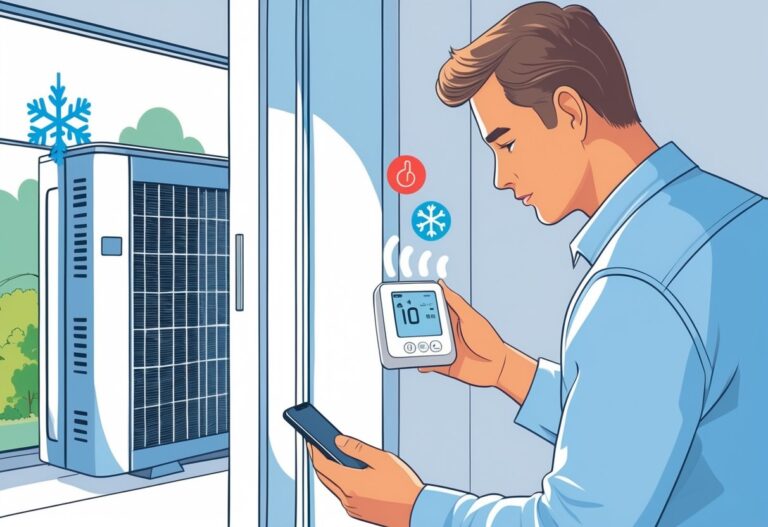
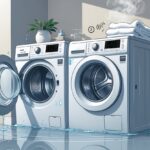

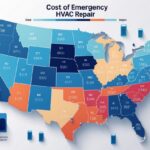
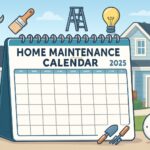


Leave a Reply